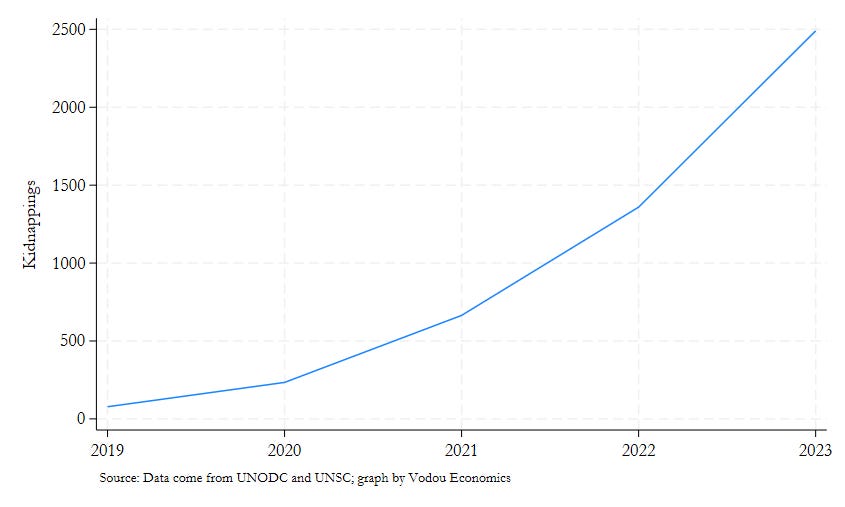This week, the UN Security Council is discussing the Haitian situation. The discussion is motivated by two big dates on the horizon: one is Jan 26, when Kenya is supposed to clarify whether Kenyan forces will enter Haiti to help combat gangs; the other is Feb 7, when Prime Minister Ariel Henry’s power expires.
In preparation for the discussions, the UN released a new report on the dire situation in Haiti. The report gave some context for the worsening situation, but since my data extended further back in time, I decided to update my figures.
The results are not good.
First, kidnappings in Haiti. These have been in the news especially this week: on Jan 19, six nuns were kidnapped, provoking the Pope himself to ask for their release. Fortunately, today (Jan 25), the nuns were released.
The graph shows that kidnappings are growing faster every year. This is probably one of the greatest burdens on everyday Haitians because it significantly affects their day-to-day life. Just this last week, I was talking to a minister at a church in Petion-Ville and he said that these threats have led to a significant decline in attendance at Sunday services.
Next, homicides. Shockingly, homicides, which were already so high, more than doubled from 2022 to 2023. The UN report calculates that the homicide rate is 40.9 per 100,000 people. But that’s for the whole country. Considering nearly all of those homicides are concentrated in Port-au-Prince, that could be a homicide rate of 164.3 per 100,000, making Haiti’s capital one of the top 3 most dangerous cities in the world.
One figure not showing much change was how many police officers died. Deaths were consistent from 2021 to 2023. But in 2023, 1,663 officers left the force. There are only 13,196 officers in the country of about 12 million people.
While I don’t have more data on other figures cited in the report, there were more interesting data to consider:
Haiti’s prisons are built to hold 3,900 inmates. Currently they hold 11,778.
4.35 million Haitians (40% of the population) are classified as suffering from acute food insecurity
40% of Haitians reported a decrease in remittances from relatives abroad
73,000 cases of cholera in 2023






And note that the central bank basically hasn't published any economic statistics since May 2023, but the Haitian Statistical Institute puts inflation at 22% as of November.